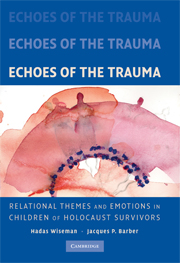Book contents
- Frontmatter
- Contents
- Foreword by Dan Bar-On
- Preface
- Acknowledgments
- 1 Introduction – A Narrative Approach to Bridging the Gap between Clinical Case Studies and Empirical Research on Children of Holocaust Survivors
- 2 Studying Relationship Narratives with the Core Conflictual Relationship Theme Method
- PART ONE RELATIONAL THEMES IN THE NARRATIVES
- PART TWO EMOTIONS IN THE NARRATIVES
- 6 Anger
- 7 Guilt, Shame, and Embarrassment
- 8 Anxiety and Helplessness
- 9 Loneliness
- 10 Joy and Pride
- PART THREE HEALING TRAUMA IN THE CHAIN OF THE GENERATIONS
- Appendix
- References
- Index
9 - Loneliness
Published online by Cambridge University Press: 29 July 2009
- Frontmatter
- Contents
- Foreword by Dan Bar-On
- Preface
- Acknowledgments
- 1 Introduction – A Narrative Approach to Bridging the Gap between Clinical Case Studies and Empirical Research on Children of Holocaust Survivors
- 2 Studying Relationship Narratives with the Core Conflictual Relationship Theme Method
- PART ONE RELATIONAL THEMES IN THE NARRATIVES
- PART TWO EMOTIONS IN THE NARRATIVES
- 6 Anger
- 7 Guilt, Shame, and Embarrassment
- 8 Anxiety and Helplessness
- 9 Loneliness
- 10 Joy and Pride
- PART THREE HEALING TRAUMA IN THE CHAIN OF THE GENERATIONS
- Appendix
- References
- Index
Summary
Loneliness is an affective and cognitive reaction to a threat to social bonds, hence, a universal experience inherent in the human condition (Rotenberg, 1999). Every person may experience loneliness at some time in life, at least transiently, but severe and persistent feelings of loneliness can have dire consequences for mental health and well-being (Heinrich & Gullone, 2006; McWhirter, 1990). Much research on loneliness has centered on individual differences associated with loneliness in adults (Ernst & Cacioppo, 1999), and more recently in childhood and adolescence (Perlman & Landolt, 1999). The salience of acute feelings of loneliness in survivors of trauma, both in the midst of the traumatic experiences and in the aftermath of trauma, is well documented in the clinical literature (Dasberg, 1976; Herman, 1997). In this chapter we present our analysis of the echoes of the parental trauma in the recollected subjective loneliness experiences of the sons and daughters as expressed in their narratives.
Research on parental antecedents of loneliness has suggested that parents may “hand down” their loneliness to their offspring (Lobdell & Perlman, 1986). More broadly, Rotenberg (1999) referred to the parental antecedents of loneliness as “parents' affective states and behavior that affect their children's loneliness” (p. 176). Rotenberg tested the relationships between various parenting variables and loneliness in children and adolescents in a cross-sectional study. He concluded that multiple factors may account for parental antecedents of loneliness in children, including quality of attachment (Cassidy & Berlin, 1999), parenting styles of warmth and involvement, and parents' promotion of peer relationships.
- Type
- Chapter
- Information
- Echoes of the TraumaRelational Themes and Emotions in Children of Holocaust Survivors, pp. 154 - 169Publisher: Cambridge University PressPrint publication year: 2008

